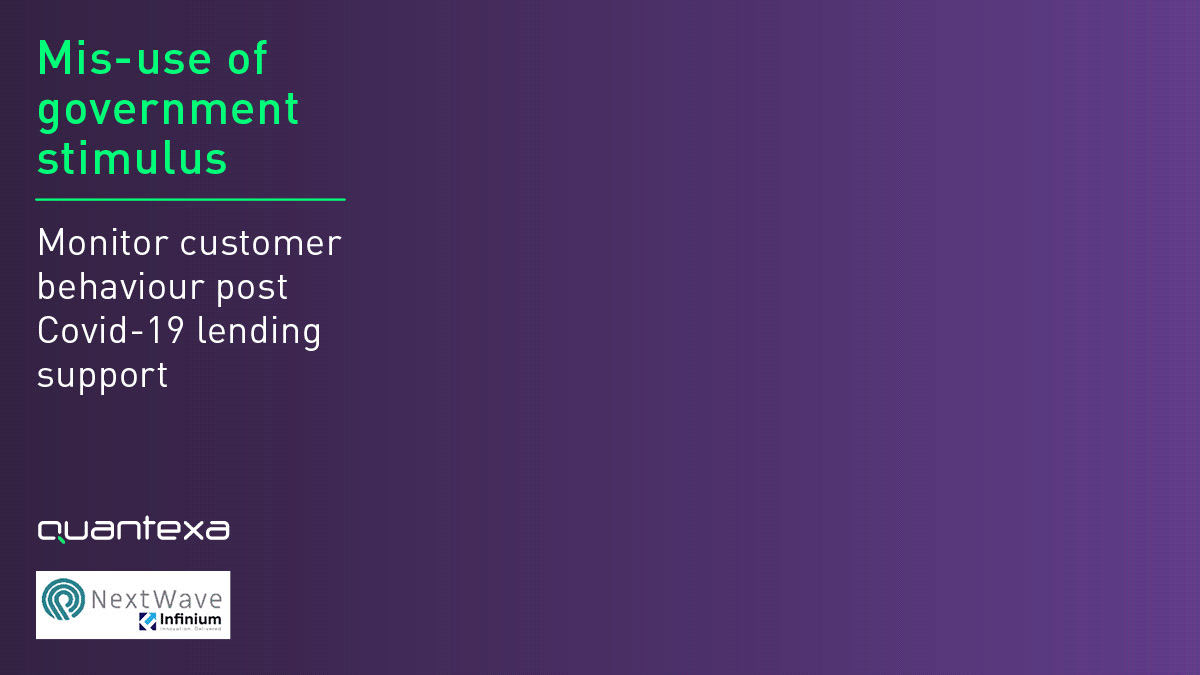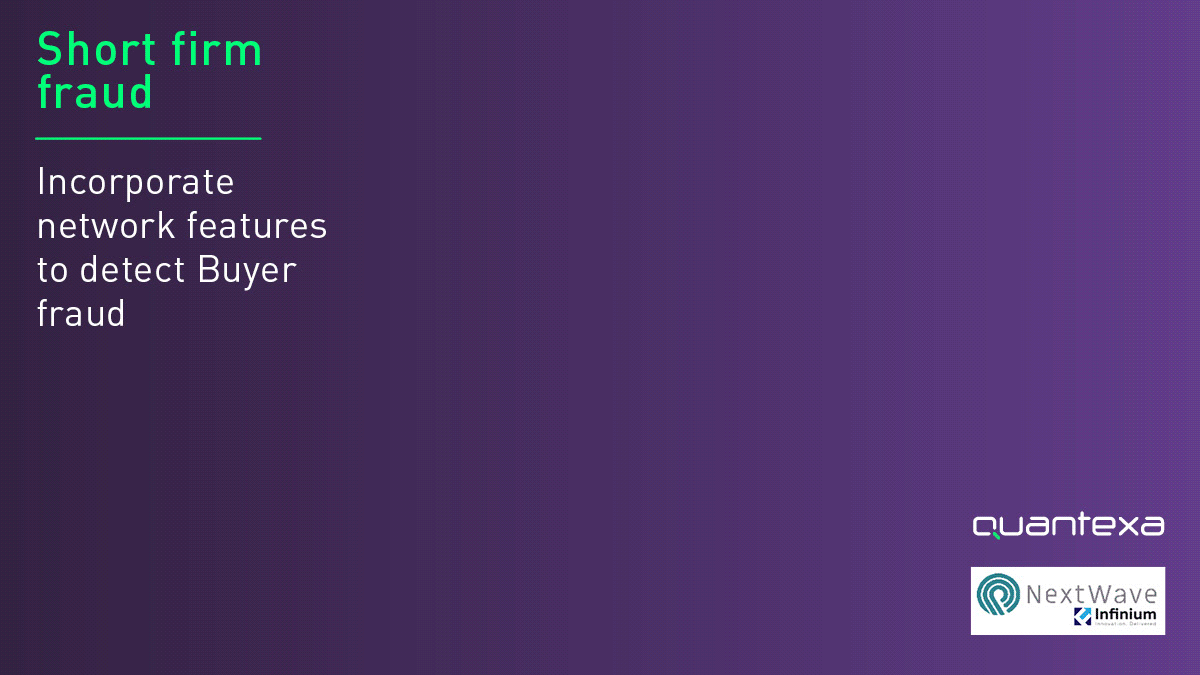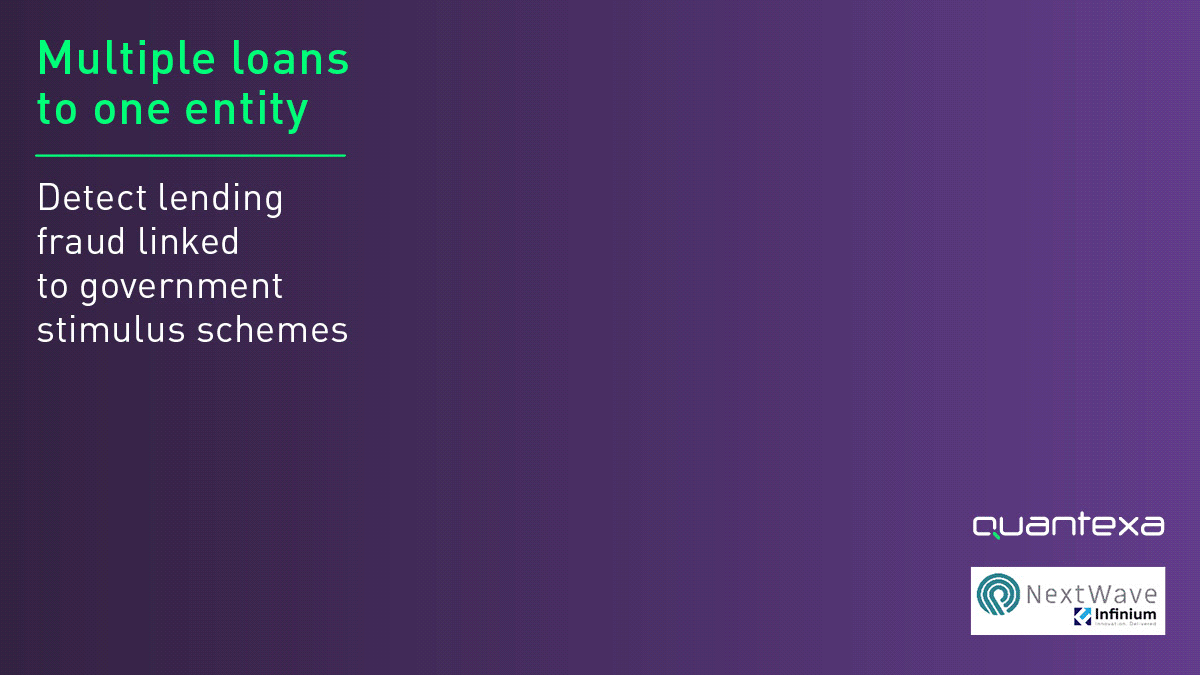NextWave has partnered with Quantexa to identify the different types of prevalent fraud
Perspectives / Fraud during COVID
Billions have been lent, and continue to be lent, to help support small businesses and individuals. Unfortunately, initial signs are that a large number of the applications were fraudulent.
Since the onset of COVID and related introduction of Government loan schemes for business, billions have been lent globally and continues to be lent, to help support small businesses and individuals in these challenging times. This has led to an unprecedented rise in loan applications and approvals, with banking portfolios increasing substantially. Unfortunately, the initial signs are that this has also resulted in a large number of fraud-related applications, estimated to already stand more than £4bn in the UK alone.
We have been working with Quantexa to identify the many different types of fraudulent behaviours that we expect our banking clients to now be facing. As lending volumes continue to rise, the workload in trying to quickly identify and prevent fraudulent loan applications only looks set to increase.
We have decided to share our findings here and with the LinkedIn community, to help our clients mitigate against these behaviours and to offer a solution that can quickly identify fraud in large loan books, with the use of technology and small expert teams.
4th December 2020 – Breaking News
The ECB has warned banks that they will be issuing a ‘‘Dear CEO” letter focused on COVID lending and improving oversight and management of their loan books. The ECB talks about setting up a network of bad banks across the EU to lift the burden of the predicted wave of bad debts, estimated to be at least 1.4tn Euros.
The letter that is expected to be sent on the 4th of December 2020 will urge banks to get their loan books in order whilst also asking them to identify expected losses and fraudulent behaviour. The ECB added that they will be looking to ”challenge banks” to be able to come up with reliable predictions as to the level of losses, something that Quantexa and Nextwave are well-positioned to assist with.
The ECB added that there are three buckets that eurozone banks fall into, depending on how they have dealt with their loan books.
Bucket 1: Individual client assessment on the likelihood of default
Bucket 2: Broad general provisions have been taken, without assigning specific client names to the expected losses
Bucket 3: A ”wait and see” approach
Fraudulent Behaviours In The Banking Book

Misuse Of Government Stimulus
What Happens
The borrower applies for government COVID related loan funds to support their business and employees.
The End Result
The funds are misappropriated by the borrower and not used to support the company employees, or provide the basic subsistence required to support the organisation. Funds are instead used to repay personal debt, pay off other corporate loans or buy a personal asset, such as a car. Banks begin to report that their outstanding loan books and credit card lending has declined, but that the Government-backed COVID lending has increased.

Short Firm Fraud
What Happens
Criminals set up an apparently legitimate business but with the intention of defrauding both its suppliers and customers. The fraudulent business has no regular day-to-day trading activity, operating as a dormant shell.
The End Result
Once the company is established the fraudsters take out COVID specific loans. They then use these funds to purchase goods posing as buyers, which are delivered to third-party addresses. The goods are then sold on for cash on the black market and the fraudsters then disappear, with the COVID funds remaining unpaid and the leaving the Government to suffer the loss.

Multiple Loans To One Entity
What Happens
One entity makes multiple applications for government-backed loan(s) with multiple banks using the same underlying business and staff members.
The End Result
The company receives support multiple times contrary to scheme rules. The banks involved may not be able to claim on the government guarantee in the case of default as multiple banks will be looking to claim repayment against the same borrower.
Interested in digital acceleration?
Subscribe to NextWave for occasional email updates on the latest technology, acceleration approaches, news and NextWave events. You can unsubscribe from these communications at any time.
Subscribe for our latest updates
Tags:
Data
November 17, 2020
